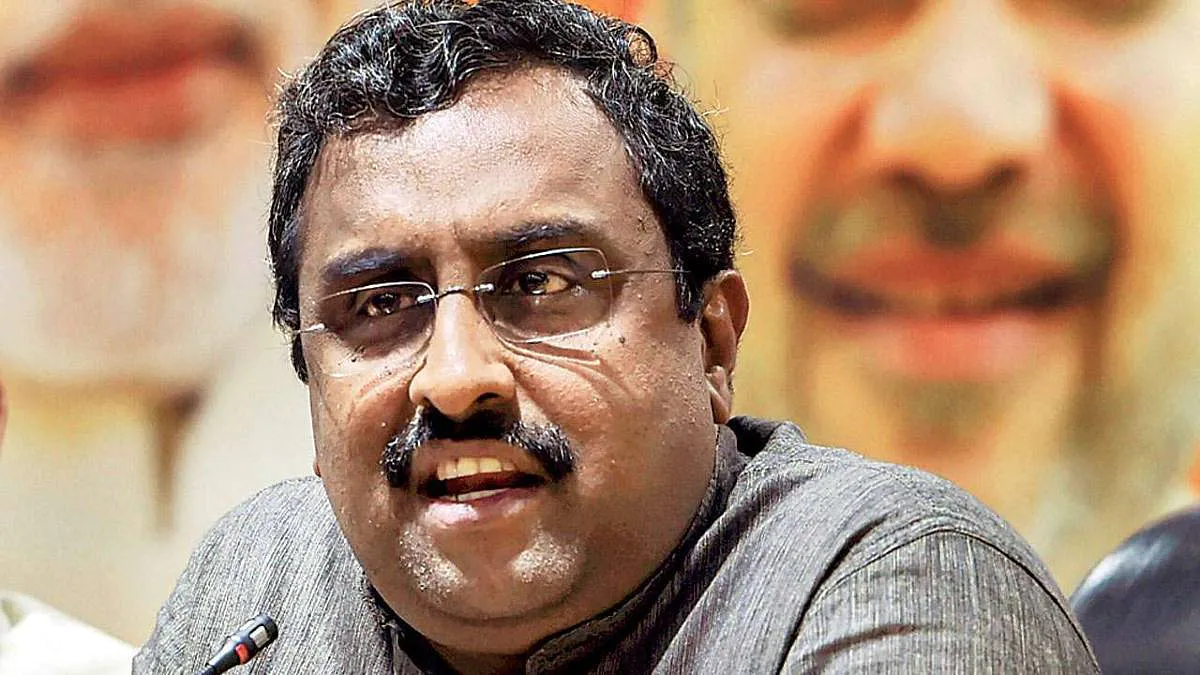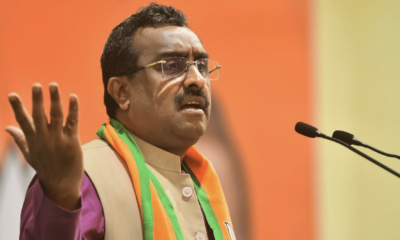
|
Getting your Trinity Audio player ready...
|
(The text of the interview was originally published by The Print on June 8, 2022. Views expressed are personal.)
The three concepts of kafir (‘unbeliever’), ummah (a supra-national community tied by religion) and jihad (‘struggle’, often used in the sense of ‘holy war’) are hindering the assimilation of Muslims into Indian society at large, senior Rashtriya Swayamsevak Sangh (RSS) functionary Ram Madhav has said.
Once Indian Muslims “accept” that their roots predate the Islamic invasions of the country and forsake the “iconoclastic” mediaeval history of Islam, Hindus will also stop talking about the “destruction that happened hundreds of years ago”, Madhav, a member of the RSS’s national executive committee, said in an exclusive interview with ThePrint.
Madhav also came out in support of the “aggrieved” Kashmiri Pandits amid protests over targeted killings in the Valley. He said that although the prime minister’s employment package provided returning Pandits with jobs, “Where is the security?” The RSS leader said that local stakeholders should be involved in Kashmir-related discussions. “When killings are happening, there is no political leadership to reach out to; they are sitting idle. We need to bring them back into action.”
Discussing the Hindu-Muslim legal tussle over the Gyanvapi mosque in Varanasi, he said,”Gyanvapi is offering a very good opportunity to all of us. In the case of Ram Janmabhoomi, we (Hindus and Muslims) could not come together and negotiate an acceptable settlement. We left it to the court. Gyanvapi, Kashi Viswanath and Mathura are very important cases. We could have come together in 1990 and resolved the Babri Masjid issue. But we could not come together and an unfortunate incident (the demolition of the Babri Masjid on 6 December 1992)happened.”
Referring to RSS chief Mohan Bhagwat’s comments on the Gyanvapi case, and his averment about not needing to find “a Shivling in every mosque”, Madhav said “Now, Bhagwat ji was very clear about the present issue (of Gyanvapi). Neither the RSS nor any affiliate demanded anything with regard to the Gyanvapi case, rather the demand came from people. It is now pending before the court, and the judiciary may take another decade. Can we come together and solve it? But for coming together, Muslims have to accept that this happened during the mediaeval Islamic invasion. We need to appreciate each other’s religious sentiments. Once that happens, Hindus won’t need to dig up old issues, and also won’t need to see a Shivling in every mosque.”
Muslims need to give up three things, and the most important of them is giving up the idea of calling non-Muslims kafir, he said.
“Islam has five pillars — loyalty to the religion, namaz five times a day, zakat or donation for the welfare of the people, fasting during Ramadan and taking a pilgrimage to Mecca or Medina. Follow that, nobody will stop you (the Muslims) in this country. There are three other things that come in the way of the large issue of inclusivity in national society.
“The concept of ummah which means, ‘we are a separate nation, because we are Muslims’. They have to give this up. They have to stop believing in the whole concept of kafir. According to them, non-Muslims are kafir, or sinners. In day-to-day parlance, nobody is a kafir. They have to stop using that. And then they have to sacrifice their way of jihad. If it is jihad, it has to be internal. Many Muslim scholars say ‘jihad has to be internal.’ Jihad does not mean you kill people of other religions,” Madhav said.
‘Be Indian, stop relating to Islamic invaders’
Indian Muslims have to “understand and accept” they are part of this land, and condemn the “wrongdoings” of Islamic aggressors or invaders, Madhav said.
“Islam came through invaders. Iconoclasm was an integral part of mediaeval Islam. They not only did that with the Hindus in India, but also with the Christians in Europe and with the Jews in Israel. The forefathers of Indian Muslims were probably not even Muslims. They might have converted later, but that part of Islamic history remained like an albatross around their neck. Indian Muslims need to understand that they don’t need to carry (this history),” Madhav asserted.
Giving the example of the Indonesian model of Islam, he said Indonesians had built a temple complex “…and here Muslims are debating over history. Indian Muslims should come forward and accept the mediaeval iconoclasm of the invaders. When that happens, half of our problems will be solved,” Madhav said.
“Let me draw a parallel, We have a large number of Anglican Christians. Anglican Christianity came with the British. But do the Anglicans align themselves with the British? Do they insist on the British legacy being owned? No, they don’t. The religion continues, but nobody supports the acts of the British.”
“Why doesn’t the same thing happen to the Muslims? Why don’t they stand up and say that they don’t support this history of invasion? Once that happens, as Bhagwat ji rightly said, the Hindus will also stop talking about the destruction that happened hundreds of years ago. But, they expect the Hindus to remain silent and devoid of any religious sentiment, while they continue to relate themselves to the iconoclastic mediaeval history of Islam,” he said, adding, “That way harmony is very difficult to achieve.”
In this context, Madhav mentioned a “general awakening” in the Hindu society, saying that Hindus have now started taking pride in their civilisation. “That is why politicians like Rahul Gandhi or Mamata Banerjee reiterate their Hindu identity. A large number of Hindus are standing up for their rights. This is not about vengeance, but about a bigger question. Are we part of the same society or would some of us relate to the Britishers, or relate to the Mughals? Is this the way we should live?”
He added, “We can live in harmony too; that is why Bhagwat ji was so emphatic about sitting together and initiating a dialogue. That will not happen through political parties or the government. We have to initiate it. But the pre-condition is an acceptance from Muslims. They have to say their ancestors are from this country, and give up the ancestry of mediaeval Islamic invaders.”
‘Involve locals in J&K’
In order to bring peace in Jammu and Kashmir (J&K), Madhav argued that the government must involve local people and stakeholders.
“All (in government) who are putting their heads together to discuss Kashmir have no local person. The Home minister, the NSA (national security advisor), the LG (Lieutenant governor) are in charge of things, but where is the local representation? Where are the (local) stakeholders? Sooner or later, we have to include them in the process,” the Sangh functionary said.
“I know the state substantially well, and with understanding I can say that it is not only development that will bring peace in J&K, but the involvement of local people,” he added.
In his previous role as the BJP’s general secretary (organisation), Madhav was in charge of J&K, and is credited with stitching up the BJP-People’s Democratic Party alliance government in 2015. The BJP, however, pulled out of the Mehbooba Mufti-led coalition government in August 2018.
“The situation in the Kashmir Valley — and I must admit that it has spilled over to Jammu too — needs greater attention from the Government of India. Terrorists have changed their ways. Earlier, they used to attack the police or the Army in an organised way; now they are into lone wolf attacks. They are more into targeted killings. There is a need for greater vigilance and certain acts from the government,” said Madhav.
“Some work was done till 2018 as we had our government. If Yasin Malik was brought to book that is because we had our government. Had the BJP government not come in J&K, the NIA (National Investigation Agency) would never have had the opportunity to continue with the investigation,” he added, referring to the separatist leader’s arrest in a terror funding case.
He added that the ongoing protests by the Kashmiri Pandits after a spate of killings are genuine. “They are aggrieved. They were brought back to the region in the last few years. The PM’s package provided them jobs, but where is the security? They have to feel secure too.”



